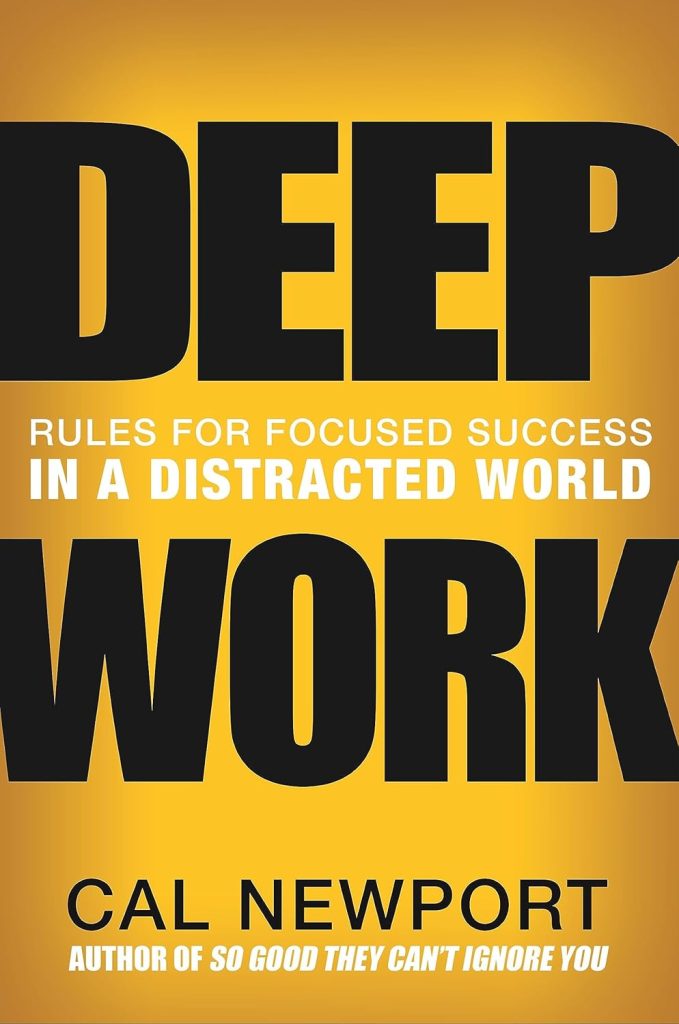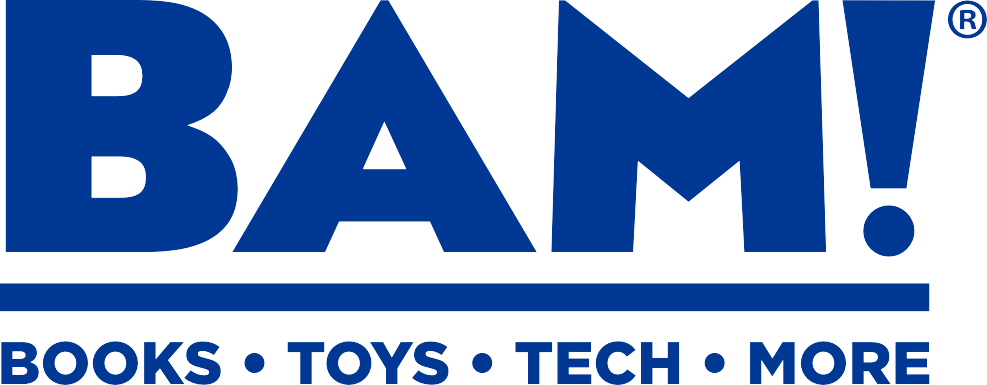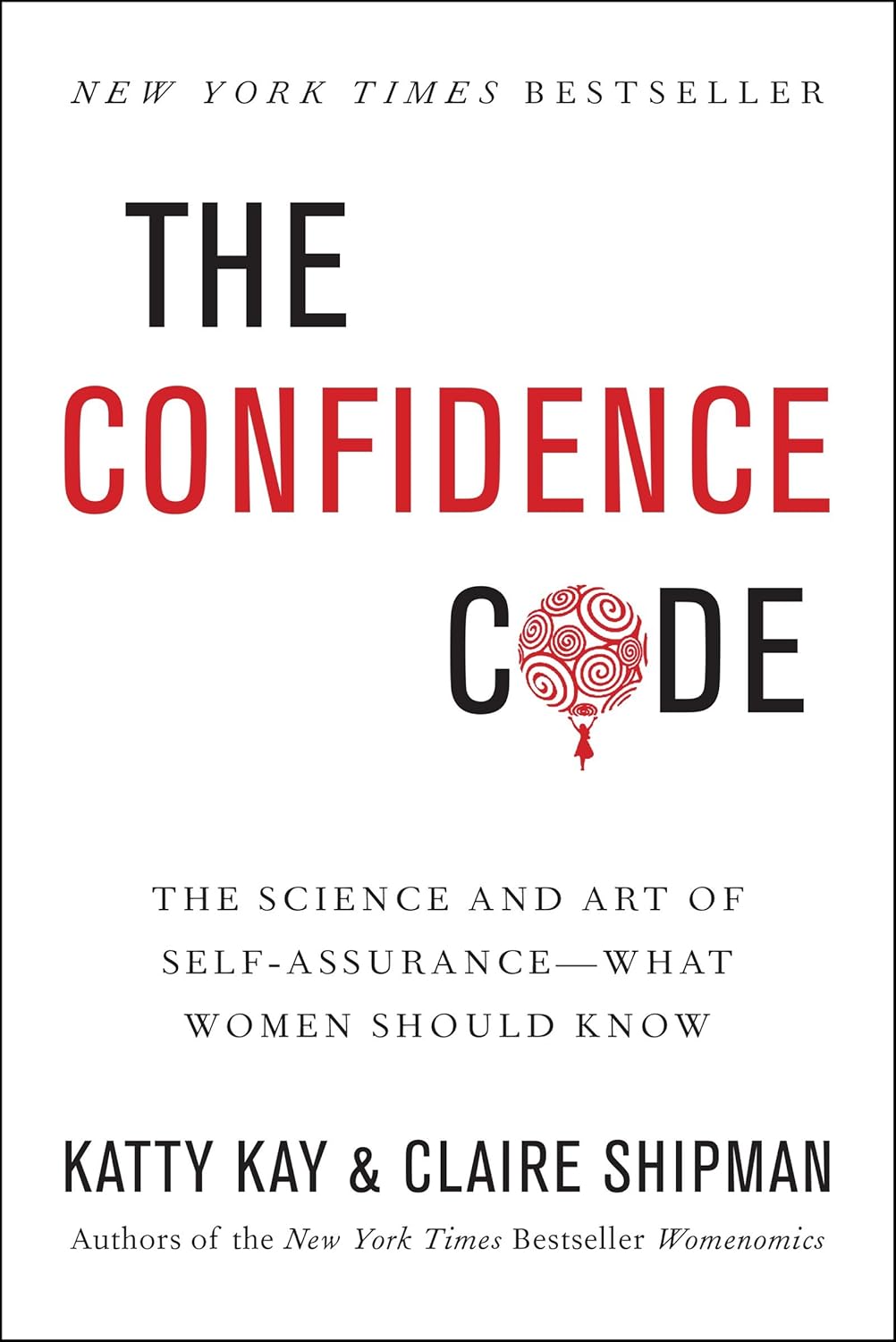
Buy The Book
Deep Work: Rules for Focused Success in a Distracted World

About
The book explores the concept of deep work, defined as professional activities performed in a state of distraction-free concentration that push cognitive capabilities to their limit. Newport argues that deep work is increasingly valuable in our modern economy, yet becoming rare due to the rise of network tools and shallow work. Through historical and contemporary examples, including Carl Jung, J.K. Rowling, and Bill Gates, Newport demonstrates how deep work leads to exceptional productivity and success. He provides strategies for cultivating deep work habits, such as minimizing distractions and scheduling uninterrupted time for focused thinking.
Cal Newport, a computer science professor at Georgetown University, is known for his research on the intersection of technology and culture. His work emphasizes the importance of focus and deliberate practice in achieving meaningful accomplishments in both professional and personal life.

Spark
Learn
Review
✦ Introduction
In the serene Swiss village of Bollingen, Carl Jung found his sanctuary in 1922, constructing a retreat called the Tower. After observing meditation spaces during a visit to India, I expanded this retreat to include a private office, a place for solitude and reflection. Here, I engaged in profound, undisturbed work, crucial for advancing my ideas, especially following the bold step of publishing “Psychological Types,” which diverged from Freud’s theories.
In “Daily Rituals,” Mason Currey highlights my disciplined routine at Bollingen. Rising early, I dedicated mornings to intense writing sessions, followed by afternoons of meditation and nature walks. The absence of electricity meant embracing simplicity, with oil lamps and fireplaces providing comfort. This retreat wasn’t an escape but a strategic move to deepen my understanding of the unconscious, crucial for my professional goals.
Deep work, a term I coined, describes the focused, distraction-free efforts necessary for pushing intellectual limits. This state of concentration is essential for creating value and honing skills, as demonstrated by influential figures like Michel de Montaigne, Mark Twain, and Woody Allen, who embraced similar practices. In contrast, modern knowledge workers often succumb to shallow tasks, fragmented by constant digital distractions.
The shift toward shallow work, driven by network tools, poses a challenge. However, the ability to perform deep work offers a significant opportunity for those willing to resist this trend. Like Jason Benn, who transformed his career by learning to code through dedicated focus, embracing deep work can lead to substantial personal and economic rewards.
In an increasingly distracted world, building personal sanctuaries for deep work can unlock creativity and innovation, echoing the practices of the most productive and influential minds throughout history.
✦ Deep Work Is Valuable
As the 2012 Election Day approached, an unexpected surge of traffic hit a blog run by Nate Silver on the New York Times website. Not long after, ESPN and ABC News snagged Silver, highlighting the economic value of skills like his. David Heinemeier Hansson, a programming virtuoso who created Ruby on Rails, and John Doerr, a venture capital powerhouse, also exemplify success in today’s economy.
Erik Brynjolfsson and Andrew McAfee, in “Race Against the Machine,” argue that digital technology is reshaping labor markets. As machines evolve, many roles become automated, and communication advancements make outsourcing more feasible. Yet, while some jobs diminish, others thrive, especially for those who excel in three particular areas.
High-skilled workers, like Nate Silver, thrive by mastering complex machines and extracting value from them. The ability to interact effectively with intelligent systems becomes crucial. Superstars, exemplified by Hansson, benefit from technology eradicating geographical constraints. High-speed data networks allow top talent to compete on a global scale, amplifying their reach and rewards.
These shifts create a divide: those who adapt and harness these changes excel, while others struggle. The ability to perform deep work—intense, undistracted focus on challenging tasks—sets individuals apart and elevates their contributions. This skill not only enhances personal achievement but also aligns with the demands of our rapidly evolving economy.
In embracing deep work, I recognize the opportunity to produce exceptional value. By cultivating this ability, I position myself to thrive amidst technological advancements, leveraging focus and expertise to achieve remarkable results. As I navigate this landscape, the emphasis on depth over distraction becomes a pivotal strategy in securing success and fulfillment in a world defined by constant change.
✦ Deep Work Is Rare
In today’s work environment, deep work has become increasingly rare. The rise of network tools, like email and social media, fragments our attention, keeping us in a state of shallow work. Many knowledge workers spend significant portions of their day in a whirl of digital distractions, responding to messages and engaging in brief, scattered tasks that demand little cognitive effort.
As I observe this trend, I notice that our culture often values busyness over productivity. The constant connectivity gives an illusion of accomplishment, but it mainly results in shallow outputs that are easy to replicate. Meanwhile, deep work, which requires long stretches of uninterrupted focus, is sidelined.
Open office plans, frequent meetings, and an emphasis on instant communication further erode opportunities for deep work. These elements might foster collaboration, but they also generate a noisy environment, making it difficult to concentrate. The expectation to be always available and responsive compounds this issue, leaving little room for intensive cognitive efforts.
Despite the challenges, the ability to engage in deep work remains a crucial skill. It allows us to tackle complex problems, innovate, and produce high-quality results that are difficult to imitate. As I navigate this reality, I understand that cultivating deep work requires intentional effort and a commitment to resist the pull of distractions.
In a world where deep work is rare, those who prioritize it stand to gain significant advantages. By creating conditions that support focused thought and minimizing interruptions, I can harness my cognitive capabilities to their fullest, achieving outcomes that set me apart in a crowded and hectic landscape. Embracing depth over shallowness becomes a strategic choice, enabling me to thrive in an economy that increasingly rewards those who can master this elusive skill.
✦ Deep Work Is Meaningful
Engaging in deep work brings a profound sense of meaning and satisfaction. When I immerse myself in focused, uninterrupted effort, I tap into a state that aligns closely with human fulfillment. This experience contrasts sharply with the shallow, fragmented activities that often pervade our daily routines.
Psychologist Mihaly Csikszentmihalyi’s concept of “flow” resonates here. In flow, I’m completely absorbed in a task, losing track of time and external distractions. This state not only enhances my productivity but also enriches my sense of purpose and contentment. The intense focus required for deep work often leads me to this flow state, where challenge and skill are perfectly balanced.
As I commit to deep work, I find that it fosters a deeper connection to my craft and a stronger sense of identity. The act of concentrating deeply on meaningful tasks allows me to produce work that I can take pride in, work that has a lasting impact. This aligns with the philosophies of great thinkers and creatives who sought depth to achieve excellence.
Moreover, deep work cultivates a sense of mastery. By dedicating time and energy to honing my skills, I experience growth and improvement, which in turn fuels my motivation. The journey of becoming better at something valuable provides a continuous source of meaning.
In a world filled with distractions, choosing to engage in deep work is a powerful statement. It signifies a commitment to depth, quality, and purpose. By prioritizing meaningful, focused effort, I not only enhance my professional achievements but also enrich my personal satisfaction. This alignment between work and meaning underscores the value of deep work, making it a cornerstone of a fulfilling life. Embracing deep work, I find, is not just about productivity—it’s about leading a life rich with meaning and purpose.
✦ Rule No.1, Work Deeply
Achieving deep work requires creating an environment and mindset that foster intense concentration. In a world brimming with distractions, I must be deliberate in cultivating habits that support sustained focus.
Establishing rituals and routines is a foundational step. By designating specific times and spaces for deep work, I create a predictable environment conducive to concentration. This might involve starting my day with focused tasks or setting up a dedicated workspace free from interruptions, allowing me to dive deeply into my work without external disruptions.
Managing willpower is crucial since it is a limited resource. To conserve it for deep work, I can automate decisions and streamline routines. Preparing my workspace the night before or having a set schedule reduces decision fatigue, freeing mental energy for more demanding tasks. This approach ensures that my cognitive resources are preserved for when I need them most.
Embracing boredom is another essential practice. Modern life tempts me with constant stimulation, but learning to tolerate boredom strengthens my focus. By resisting the urge to check my phone or seek quick distractions during idle moments, I train my mind to endure discomfort, enhancing my ability to engage deeply in meaningful work.
Productive meditation offers a way to incorporate deep thinking into daily activities. While walking or commuting, I can concentrate on a single problem, using the time for uninterrupted thought. This practice helps develop the skill of maintaining focus even amidst routine tasks, reinforcing my capacity for deep work.
Working deeply demands intention and discipline. By creating supportive rituals, conserving willpower, embracing boredom, and integrating deep thinking into my routine, I cultivate an environment where my cognitive abilities can thrive. This commitment not only boosts productivity but also enriches my work with purpose and meaning.
Prioritizing deep work over distractions allows me to stand out in a world where superficial engagement is common. By dedicating myself to depth, I not only achieve high-quality results but also find fulfillment in my professional pursuits. This focus on meaningful work empowers me to navigate the complexities of modern life with clarity and determination.
In embracing deep work, I discover the potential of my abilities and the profound rewards of a life centered around purposeful effort. Through intentional practice, I cultivate a professional life that is both rewarding and meaningful, guided by the principles of focus and depth. This dedication becomes a cornerstone of my journey, leading me toward a more intentional and fulfilling existence.
By committing to work deeply, I ensure that my efforts align with my goals and values, allowing me to make significant contributions in my field. This practice not only enhances my productivity but also reinforces my sense of purpose, making deep work an integral part of my growth and success. Through this approach, I find a path to excellence and lasting impact, driven by the power of focused, meaningful work.
✦ Rule No.2, Embrace Boredom
In the journey toward mastering deep work, learning to embrace boredom is crucial. In a world filled with constant distractions, training my mind to tolerate boredom strengthens my ability to focus intensely when it matters most.
One strategy involves resisting the urge to fill every idle moment with distractions like checking my phone or browsing the internet. Allowing myself to experience boredom without immediately seeking stimulation builds mental resilience. This practice enhances my capacity for deep focus, preparing me to tackle complex tasks without distraction.
Scheduling breaks for distractions rather than succumbing to them impulsively is another effective approach. By designating specific times for checking emails or social media, I preserve the integrity of my deep work sessions. This disciplined routine helps me maintain control over my attention, ensuring that distractions don’t fragment my focus.
Productive meditation is a technique that integrates deep thinking into everyday activities. While engaging in routine tasks like walking or commuting, I focus on a single problem or idea. This habit transforms otherwise idle time into an opportunity for deep thought, helping me develop the skill of sustained concentration.
Training my mind to embrace boredom also involves recognizing the allure of instant gratification. In today’s world, I’m constantly tempted by quick distractions that offer immediate rewards. By learning to resist these temptations, I strengthen my ability to engage deeply with complex challenges.
Building this discipline not only improves the quality of my work but also enriches my sense of purpose. As I refine my focus, I find that the depth of my engagement with tasks increases, leading to greater satisfaction and achievement. The ability to concentrate deeply becomes a valuable skill that sets me apart in a distracted world.
Embracing boredom is about more than just productivity; it’s about leading a life rich in meaning and accomplishment. By dedicating myself to depth, I not only produce valuable work but also enhance my personal growth and fulfillment. This commitment to deep work becomes a cornerstone of my professional and personal journey, guiding me toward a more focused and intentional existence.
In a world where distractions are abundant, choosing to embrace boredom and prioritize deep work allows me to navigate life’s complexities with clarity and determination. By continuously refining my ability to concentrate, I ensure that my efforts are directed toward achieving excellence and making a lasting impact. This dedication to depth empowers me to harness my cognitive abilities fully, unlocking the true potential of my capabilities.
Through this practice, I discover the profound rewards of a life well-lived, grounded in deep work and meaningful pursuits. Embracing boredom becomes a powerful tool in my pursuit of excellence and fulfillment, allowing me to thrive in an environment filled with distractions. By prioritizing focus over superficial engagement, I cultivate a professional life that is both rewarding and meaningful, reinforcing the value of deep work as a guiding principle.
✦ Rule No.3, Quit Social Media
In the quest for deep work, reevaluating my relationship with social media is essential. These platforms are designed to capture attention, often at the expense of focus and productivity. To truly engage in meaningful work, it’s important to assess the impact of social media on my life and make intentional choices about its place in my daily routine.
One effective strategy is the “craftsman approach,” which involves evaluating each tool based on whether its benefits significantly outweigh its drawbacks. If a social media platform doesn’t offer substantial value to my personal or professional life, I should consider removing it. This approach is not about rejecting technology entirely but about being deliberate and selective with my digital engagement.
Experimenting with a temporary break from social media can offer valuable insights into its influence on my focus and mental clarity. By stepping back, I can observe changes in my attention span and productivity, gaining perspective on how these platforms affect my cognitive abilities. This period of abstinence allows me to determine which, if any, social media tools are worth reintegrating into my life.
Reducing social media use creates more room for deep, focused work. By eliminating distractions, I can direct my energy toward activities that align with my goals and values. This intentional reduction not only enhances productivity but also enriches my interactions and pursuits with greater purpose and depth.
Embracing this shift requires acknowledging the allure of instant gratification that social media offers. Training myself to resist this temptation strengthens my ability to concentrate on complex tasks. As I refine this discipline, the quality of my work improves, and my sense of purpose deepens.
In prioritizing deep work over superficial engagement, I commit to a more focused and fulfilling existence. This choice empowers me to navigate the digital landscape with clarity and intention, ensuring that my cognitive resources are devoted to meaningful endeavors. By making deliberate decisions about my digital environment, I reinforce the value of deep work as a cornerstone of both my professional and personal growth.
Ultimately, quitting or significantly reducing social media is about reclaiming control over my attention and time. This shift not only enhances my productivity but also enriches my life with more intentional and rewarding experiences. By choosing depth over distraction, I set myself apart in a world where shallow engagement is common, allowing me to achieve greater success and satisfaction.
Through this commitment to minimizing social media, I discover the profound rewards of a life focused on meaningful work. This intentional approach to managing my digital habits fosters a deeper connection to my goals and aspirations, ensuring that I make the most of my cognitive abilities. In choosing to quit social media, I embrace a path of clarity, purpose, and fulfillment, guided by the principles of deep work.
✦ Rule No.4, Drain the Shallows
In the pursuit of deep work, it’s crucial to minimize the time spent on shallow tasks—those low-value, non-cognitively demanding activities that can dominate my day if not carefully managed. By reducing shallow work, I create more space for activities that require intense focus and contribute significantly to my goals.
A practical approach is to plan every minute of my day. By doing so, I take control of my schedule, ensuring that deep work blocks are prioritized and protected. This method involves allocating specific time slots for both deep and shallow tasks, maintaining a disciplined structure that prevents distractions from derailing my focus.
Setting strict limits on shallow work is another effective strategy. For example, I can designate certain periods for handling emails or administrative duties, ensuring these tasks don’t encroach on my deep work time. This boundary-setting helps preserve the quality and integrity of my focus, allowing me to engage fully with more important projects.
It’s also beneficial to evaluate the depth of each task. By assessing the true value and necessity of activities, I can prioritize those that align with my long-term objectives. This prioritization ensures that my time and energy are dedicated to high-impact efforts, maximizing the return on my investment in terms of productivity and personal growth.
Creating a schedule that supports deep work involves more than just managing tasks—it’s about fostering an environment where focus can thrive. This means eliminating unnecessary meetings, reducing time spent on low-value activities, and ensuring that my workspace is conducive to concentration. By doing so, I reinforce my commitment to depth and create conditions that support sustained, meaningful effort.
Additionally, I can embrace tools and techniques that enhance efficiency and reduce the cognitive load of shallow tasks. Automating repetitive processes and using technology to streamline workflows can free up more time for deep work. By leveraging these resources, I minimize the drain of shallow activities and focus my mental energy on tasks that truly matter.
To maintain this balance, it’s important to regularly review and adjust my schedule. By reflecting on my daily activities, I can identify areas where shallow work has crept in and make necessary adjustments. This ongoing assessment ensures that my focus remains sharp and aligned with my goals, allowing me to continue honing my ability to work deeply.
In embracing the practice of draining the shallows, I commit to a work routine that values depth and purpose over distraction and busyness. This intentional approach not only boosts my productivity but also enriches the quality of my output, providing a sense of accomplishment and fulfillment. By focusing on what truly matters, I cultivate a professional life that is both rewarding and meaningful.
Through this commitment to deep work, I navigate a world filled with distractions with confidence and clarity. By continuously refining my ability to manage shallow tasks, I ensure that my efforts are directed towards achieving excellence and making a lasting impact in my field. This dedication to depth becomes a cornerstone of my personal and professional journey, guiding me towards a more intentional and fulfilling existence.
✦ Conclusion
Embracing deep work is a transformative choice in a world rife with distractions. By prioritizing focused, meaningful effort, I unlock the potential for high-quality output and personal fulfillment. This commitment requires intentional strategies to minimize shallow activities and distractions, allowing me to cultivate a routine where depth thrives.
When I deliberately schedule my time and set boundaries around low-impact tasks, I ensure that deep work remains a central part of my day. This disciplined approach not only enhances my productivity but also aligns my efforts with my values and long-term goals. By creating an environment that supports intense concentration, I foster the conditions necessary for achieving excellence in my field.
Reducing social media use and embracing periods of boredom further strengthen my ability to maintain focus. These practices help me resist the allure of instant gratification, training my mind to engage deeply with complex challenges. As I refine these skills, I find that the quality of my work improves, and my sense of purpose deepens.
Ultimately, the pursuit of deep work is about more than just productivity; it’s about leading a life rich in meaning and accomplishment. By dedicating myself to depth, I not only produce valuable work but also enrich my personal growth and satisfaction. This commitment to deep work becomes a cornerstone of my professional and personal journey, guiding me towards a more focused, intentional, and fulfilling existence. In a world where shallow work is prevalent, choosing to prioritize deep work sets me apart. It empowers me to navigate the complexities of modern life with clarity and determination, ensuring that I make the most of my cognitive abilities and leave a lasting impact in my endeavors. Through deep work, I discover the true potential of my capabilities and the profound rewards of a life well-lived.
For People
– Knowledge workers seeking productivity enhancement;
– Entrepreneurs aiming for innovation;
– Students striving for academic excellence;
– Professionals in creative fields;
– Individuals overwhelmed by digital distractions
Learn to
– Improved focus and concentration;
– Strategies to minimize distractions;
– Techniques for time management;
– Methods to enhance cognitive abilities;
– Insights into achieving work-life balance









